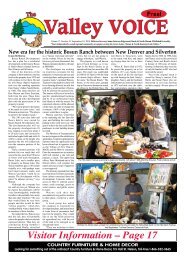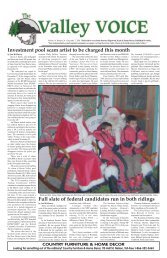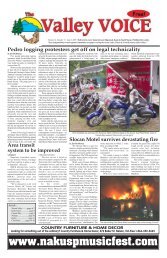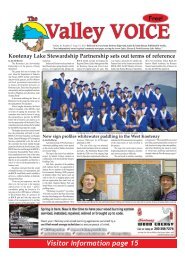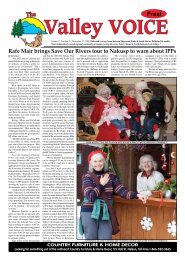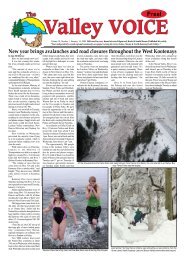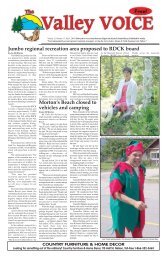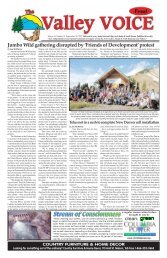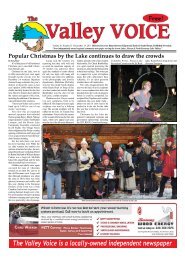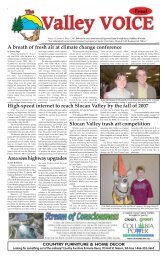The Valley Voice is 100% locally owned and operated Interior ...
The Valley Voice is 100% locally owned and operated Interior ...
The Valley Voice is 100% locally owned and operated Interior ...
Create successful ePaper yourself
Turn your PDF publications into a flip-book with our unique Google optimized e-Paper software.
6 LETTERS<br />
Pity the<br />
Palestinians<br />
<strong>The</strong> Gaza Strip <strong>is</strong> home to 1.5 million<br />
people, most of whom descended from<br />
Palestinian refugees who lost their homes<br />
when the State of Israel was created on<br />
14 May 1948.<br />
“Since the 1967 occupation of the<br />
West Bank <strong>and</strong> Gaza Strip, Israel’s<br />
military has developed a complex system<br />
of rules <strong>and</strong> sanctions to control the<br />
movement of the 3.4 million Palestinians<br />
who live there.” (Israeli human rights<br />
organization G<strong>is</strong>ha.)<br />
In January 2009, Cardinal Renato<br />
Martino, head of the Pontifical (Vatican)<br />
Council for Justice <strong>and</strong> Peace, said in an<br />
interview, “Let’s look at the conditions<br />
in Gaza: It’s looking more <strong>and</strong> more<br />
like a big concentration camp.” It seems<br />
difficult to deny the compar<strong>is</strong>on. <strong>The</strong><br />
Gaza Strip <strong>is</strong> one of the most densely<br />
populated places on earth with 11,060<br />
people per sq. mile. Gaza City <strong>is</strong> home<br />
to more than one million. People of the<br />
Strip cannot leave as they are forcibly<br />
contained within a 360 sq. km. area by<br />
a foreboding security perimeter fence.<br />
Constant aerial surveillance <strong>and</strong> the<br />
Israeli Defense Forces navy gunships also<br />
patrol Gaza’s Mediterranean Sea coast;<br />
these forces enter the Gaza Strip at will.<br />
Imports <strong>and</strong> exports are tightly controlled;<br />
unemployment <strong>is</strong> currently the norm as <strong>is</strong><br />
widespread poverty.<br />
Children 17 years of age <strong>and</strong> younger<br />
account for 48% of the population. In<br />
April 2007 the Jerusalem Post reported<br />
that 13.2% of the children in Gaza<br />
suffered stunted growth <strong>and</strong> 10% suffered<br />
permanent effects from malnutrition.<br />
In March 2008 the World Bank stated<br />
that about 80% of the population relied<br />
on some form of UN humanitarian<br />
ass<strong>is</strong>tance. Israeli-based human rights<br />
organization B’tselem documented that<br />
hundreds of thous<strong>and</strong>s of Palestinians<br />
suffer from severe water shortages<br />
throughout summer months due to<br />
Israeli restrictions. Basic functions such<br />
as drinking, bathing, watering of crops<br />
<strong>and</strong> animals <strong>is</strong> severely challenging<br />
– a violation of basic human rights<br />
affecting the health, livelihoods <strong>and</strong><br />
quality of people’s lives. Consequently<br />
desertification <strong>and</strong> soil degradation has<br />
caused the 13% of arable l<strong>and</strong> to decline<br />
even further.<br />
More recently, the United Nations<br />
Food Program officials surveyed the<br />
damage done to Gaza’s agricultural<br />
industry after the three-week Israeli<br />
assault on Gaza th<strong>is</strong> January. Officials<br />
said that between 35% <strong>and</strong> 60% of<br />
Gaza’s agricultural l<strong>and</strong>s are wrecked<br />
<strong>and</strong> some areas may never produce<br />
again. Dairy farms, livestock, chickencoops,<br />
orchards, greenhouses <strong>and</strong> all<br />
forms of water sources were destroyed.<br />
Further, 30 per cent of all arable l<strong>and</strong><br />
was severely damaged. Further still, a<br />
great deal of Gaza’s most productive<br />
farml<strong>and</strong> <strong>is</strong> located within a kilometre of<br />
the border with Israel <strong>and</strong> farmers are now<br />
afraid to work those fields. On February<br />
1 the Globe <strong>and</strong> Mail reported that Gaza<br />
farmers are being shot <strong>and</strong> killed while<br />
working their fields that are located next<br />
to the Gaza/Israeli border. Prior to th<strong>is</strong><br />
destruction, Gaza’s agriculture industry<br />
employed 25% of the total population.<br />
Victor Woods<br />
Winlaw<br />
Bail out the<br />
people, now<br />
If I had a business <strong>and</strong> failed to keep<br />
abreast of the times, didn’t retool to meet<br />
customer dem<strong>and</strong>, had poor customer<br />
relations, spent too much on perks for<br />
myself, <strong>and</strong> invested badly, then went<br />
under, would I get a bail out?<br />
No!<br />
So why <strong>is</strong> it OK to bail out banks <strong>and</strong><br />
big corporations that failed to do what<br />
they needed to do to remain fluid, but not<br />
the people or small businesses?<br />
Politicians <strong>and</strong> CEOs will tell you<br />
it’s because bailing out big banks <strong>and</strong><br />
corporations saves jobs. But does it<br />
really? Or does it just save those jobs for<br />
a little while, prolonging the inevitable?<br />
Take the auto industry for example.<br />
Econom<strong>is</strong>ts, environmental<strong>is</strong>ts, <strong>and</strong><br />
everyday people have been calling<br />
for more fuel efficient <strong>and</strong> alternative<br />
energy automobiles for decades now.<br />
Meanwhile, the industry has ignored the<br />
dem<strong>and</strong>, accepted large grants <strong>and</strong> tax<br />
breaks from government, while rewarding<br />
their CEOs, moving jobs offshore, <strong>and</strong><br />
reaping record-breaking profits! Now,<br />
in no small part due to their own folly,<br />
they’re going under, <strong>and</strong> governments are<br />
clamouring to help them out.<br />
Yet, no such offer <strong>is</strong> being made to<br />
people, who through no fault of their own,<br />
find themselves in dire economic straits.<br />
Both governments <strong>and</strong> big business<br />
br<strong>is</strong>tle at the suggestion of bailing out<br />
private individuals, helping homeowners<br />
pay for defaulted loans, restructuring the<br />
EI system so people who paid in are better<br />
covered, upping social ass<strong>is</strong>tance rates for<br />
those on the bottom rungs.<br />
“That’s social<strong>is</strong>m,” we hear them cry!<br />
Why <strong>is</strong> social<strong>is</strong>m OK for big banks,<br />
big auto, big industry, but not for the<br />
small guy?<br />
And why <strong>is</strong> the media not asking<br />
th<strong>is</strong> question? (Could it be because they<br />
are all <strong>owned</strong> <strong>and</strong> <strong>operated</strong> by the big<br />
corporations now at the public trough<br />
asking for bailouts?)<br />
How much would it cost us to top up<br />
the annual incomes of people living below<br />
the poverty line? How much would it cost<br />
to cut cheques to people who are having<br />
difficulty, due to unemployment, making<br />
their mortgages?<br />
And what would be the result of<br />
putting the billions we’re tossing at failed<br />
industries who continue to move jobs<br />
offshore <strong>and</strong> lay off workers, into the<br />
h<strong>and</strong>s of everyday people?<br />
Would they not spend it paying down<br />
their mortgages, buying food from the<br />
local grocery, rebuilding their savings,<br />
education <strong>and</strong> retirement funds, investing<br />
in their local communities?<br />
If anyone <strong>is</strong> going to be bailed out,<br />
it should be the people who have been<br />
victimized by big business <strong>and</strong> the banks,<br />
not the big businesses <strong>and</strong> the banks!<br />
And if we’re going to give money away,<br />
<strong>and</strong> go into debt for years doing it, that<br />
money should be going to where it can<br />
have the most positive effects, in our own<br />
communities. It should not be going to the<br />
individuals <strong>and</strong> businesses who, through<br />
their own folly <strong>and</strong> greed, created the<br />
meltdown in the first place.<br />
It’s time to end corporate welfare <strong>and</strong><br />
bail out the people, now!<br />
Will Webster<br />
Kaslo<br />
Fail to plan,<br />
plan to fail<br />
Area H North <strong>is</strong> a specific geographic<br />
zone differing from Area H South by<br />
virtue of its extremely beautiful lake <strong>and</strong><br />
provincial park.<br />
Still, it <strong>is</strong> surpr<strong>is</strong>ing that voters in<br />
Area H South could not d<strong>is</strong>cern what<br />
Area H North voters knew empirically:<br />
that electing a director running on an<br />
anti-planning m<strong>and</strong>ate <strong>is</strong> a huge threat to<br />
ALL stakeholders in the Slocan <strong>Valley</strong>,<br />
with the benefit going to a few who desire<br />
no control of development.<br />
Stakeholders downstream of Slocan<br />
Lake will reap the seeds of pollution<br />
that are sown by electing a director who<br />
favours uncontrolled development on<br />
Slocan Lake <strong>and</strong> in the valley below.<br />
When such diverse <strong>and</strong> responsible<br />
citizens as Anne Sherrod, Art Joyce,<br />
Liza Irel<strong>and</strong>, Dan Nicholson <strong>and</strong> Meeri<br />
Dur<strong>and</strong> feel compelled to ra<strong>is</strong>e objection<br />
or comment on the crass ineptitude of the<br />
“democratically” elected Mr. Popoff, it <strong>is</strong><br />
time for all residents to pay attention to<br />
these voices.<br />
<strong>The</strong> onus <strong>is</strong> on all residents<br />
(willing <strong>and</strong> unwilling participants<br />
in the democratic process) to educate<br />
themselves as to the content of the Area<br />
H North OCP: there <strong>is</strong> no zoning process<br />
attached to an OCP. A zoning process <strong>is</strong><br />
a regulatory <strong>is</strong>sue by which development<br />
may be controlled <strong>and</strong> guided by an OCP<br />
which describes policy.<br />
For a fuller underst<strong>and</strong>ing of the OCP<br />
implications, as described by RDCK<br />
planner Meeri Dur<strong>and</strong>, see the February<br />
11 <strong>Valley</strong> <strong>Voice</strong> story ably covered by Jan<br />
McMurray,<br />
As a part-time resident of Silverton<br />
(v<strong>is</strong>it every month) who spent hours<br />
researching <strong>and</strong> responding to the OCP,<br />
I feel I have to agree with Carolyn<br />
Parker: “…if Mr. Popoff can’t honour the<br />
planning work of the north valley, then<br />
he <strong>is</strong> not the representative of the whole<br />
valley <strong>and</strong> should step down.”<br />
It <strong>is</strong> also time for those who voted for<br />
Mr. Popoff to reflect on what harm they<br />
have done to their beautiful community<br />
<strong>and</strong> continuance of their lifestyles.<br />
Stakeholders of Slocan’s communities<br />
need only look to the Shuswap, Chr<strong>is</strong>tina<br />
Lake <strong>and</strong> the Okanagan <strong>Valley</strong> to see the<br />
effect of uncontrolled development <strong>and</strong><br />
even greater ecological d<strong>is</strong>ruption when<br />
provincial governments produce ‘Orders<br />
in Council’ exempting developers from<br />
ecological <strong>and</strong> zoning controls.<br />
Orders in Council bypass other<br />
regulatory controls <strong>and</strong> do not come about<br />
by accident. Politically soph<strong>is</strong>ticated<br />
developers know th<strong>is</strong>.<br />
… D e s p i t e g o v e r n m e n t<br />
recommendation to barge wood chips,<br />
Chambers continues to overload the<br />
ferries <strong>and</strong> highways; an OCP would<br />
give direction to regulatory bodies on the<br />
communities’ point of view.<br />
What the residents of the Slocan<br />
<strong>Valley</strong> have <strong>is</strong> priceless. …Please,<br />
communities <strong>and</strong> stakeholders of the<br />
Kootenays <strong>and</strong> the Slocan, the developers<br />
<strong>and</strong> the politicians are out there, planning<br />
<strong>and</strong> scheming to take the very thing that <strong>is</strong><br />
dearest to you, your way of life. To them<br />
it <strong>is</strong> just another way to make money<br />
<strong>and</strong> votes.<br />
You have to get involved with the<br />
official community plans <strong>and</strong> underst<strong>and</strong><br />
how they protect you <strong>and</strong> your priceless<br />
valley. <strong>The</strong> communities need unity on<br />
th<strong>is</strong> <strong>is</strong>sue.<br />
Get a plan!<br />
R. McGeachy<br />
Edmonton<br />
No definitive<br />
research on<br />
health effects<br />
of wireless<br />
technology<br />
“A little learning <strong>is</strong> a dangerous<br />
thing, Drink deep, or taste not the Pierian<br />
spring, <strong>The</strong>re shallow draughts intoxicate<br />
the brain, And drinking largely sobers<br />
us again.”<br />
When I feel pressure to hold certain<br />
beliefs, I find th<strong>is</strong> statement by Alex<strong>and</strong>er<br />
<strong>The</strong> <strong>Valley</strong> <strong>Voice</strong> February 25, 2009<br />
Pope refreshing. I can just acknowledge<br />
my “little learning,” shrug my shoulders<br />
<strong>and</strong> admit that I don’t know.<br />
Being faced with the dec<strong>is</strong>ion<br />
whether or not we should allow a wireless<br />
computer network into our school, we<br />
are confronted with taking a position in<br />
spite of our “little learning.” Who among<br />
us can really speak to th<strong>is</strong> matter with<br />
any degree of certainty? We have to be<br />
careful which experts we l<strong>is</strong>ten to. We<br />
shouldn’t ask a technician or an expert<br />
in physics or chem<strong>is</strong>try to tell us about<br />
biological effects.<br />
We can also learn to use our “little<br />
learning” more efficiently. I remember<br />
in high school learning that one of the<br />
principles of the scientific method <strong>is</strong> that<br />
legitimate scientific research <strong>is</strong> repeatable.<br />
So when I am told that half the research<br />
shows that there are health problems<br />
connected to wireless communication<br />
<strong>and</strong> the other half does not, I know that<br />
there has to be some bogus research out<br />
there. I don’t have the time or funding<br />
to study all the research, but I did take a<br />
closer look at the Dan<strong>is</strong>h study, which was<br />
large, industry funded, <strong>and</strong> appears to be<br />
most prevalently cited in defense of the<br />
wireless industry.<br />
<strong>The</strong> Dan<strong>is</strong>h study involved 420,000<br />
subjects from 1982-1995. <strong>The</strong> flaws in<br />
th<strong>is</strong> study are not difficult for a layman<br />
to underst<strong>and</strong> <strong>and</strong> I invite anyone to take<br />
a look at them. (Th<strong>is</strong> letter would get<br />
too long if I were to l<strong>is</strong>t them here.) In<br />
their conclusion they state quite honestly:<br />
“<strong>The</strong> results of th<strong>is</strong> investigation…do not<br />
support the hypothes<strong>is</strong> of an association<br />
between use of these telephones <strong>and</strong><br />
tumors of the brain or salivary gl<strong>and</strong>s,<br />
leukemia, or other cancers.” <strong>The</strong>y stopped<br />
short of pointing out that their study<br />
was not designed to investigate these<br />
associations. <strong>The</strong>y clearly had lawyers<br />
scrutinizing the language before they sent<br />
it off for publication. Journal<strong>is</strong>ts are at<br />
liberty to develop the interpretations that<br />
lead us down the garden path.<br />
Deceptive research <strong>is</strong> not put to the<br />
scrutiny <strong>and</strong> accountability as <strong>is</strong> a flawed<br />
consumer gadget that must be recalled. A<br />
scientific paper sits there <strong>and</strong> haunts us for<br />
decades after it has been publ<strong>is</strong>hed. On<br />
September 2, 2008 the Dan<strong>is</strong>h study <strong>is</strong><br />
the first “evidence” cited in an authorless<br />
article on the web, “How Dangerous <strong>is</strong><br />
Cell Phone Radiation?” (http://skeptoid.<br />
com/ep<strong>is</strong>odes/4117).<br />
Not everybody <strong>is</strong> swayed by th<strong>is</strong><br />
devious research. <strong>The</strong>re are an increasing<br />
number of countries that prohibit or<br />
d<strong>is</strong>courage the use of wireless technology<br />
by children. <strong>The</strong> evidence of negative<br />
health effects <strong>is</strong> constantly growing. Ask<br />
yourself, do you want to put your child<br />
at greater r<strong>is</strong>k than a Chinese, a Russian,<br />
an Israeli, a German, Austrian or Sw<strong>is</strong>s<br />
child? In fact, virtually all countries have<br />
tighter st<strong>and</strong>ards for wireless technology<br />
than Canada <strong>and</strong> the US.<br />
<strong>The</strong>re <strong>is</strong> a recent BBC report on<br />
concerns over wireless communication<br />
devices. I would recommend it:<br />
http://www.mastsanity.org/index.<br />
php?option=com_content&task=view&<br />
id=132&Itemid=113<br />
If you have trouble making the<br />
connection, email me at nduerichen@<br />
netidea.com <strong>and</strong> I’ll give you the link.<br />
Norbert Duerichen<br />
New Denver



